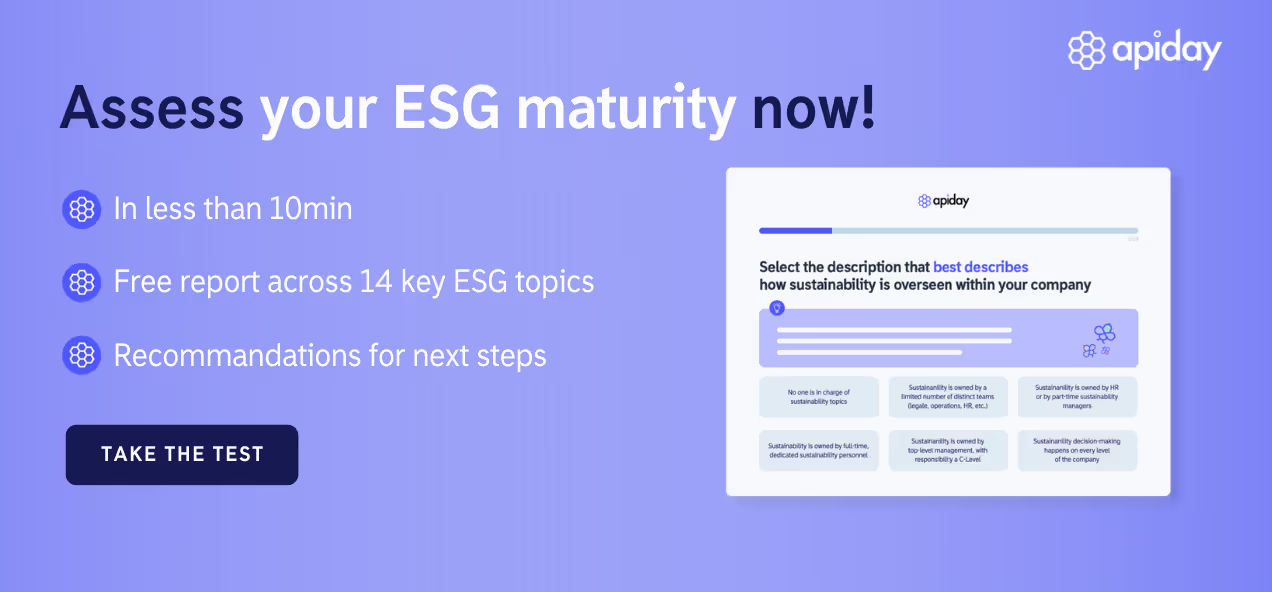ESG ratings: all you need to know about MSCI rating methodology

MSCI Inc. is a leading global investment research firm headquartered in New York City, offering a range of services including investment indexes, portfolio analysis tools, and ratings on ESG, equity, loans, mutual funds, ETFs, and countries.
One of its most important offerings is the MSCI ESG Ratings, which evaluate a company's ESG performance against peers and provide insights into ESG risk exposure and risk management.
As ESG factors increasingly affect investment decisions, understanding MSCI's rating methodology is crucial for companies, investors, analysts, and anyone interested in ESG investing.
In this article, we'll take a deep dive into MSCI's rating methodology, and explore how MSCI ratings can impact investment decisions.
Let's get started!
How do the MSCI ESG Ratings work?
MSCI rating system
The MSCI ESG Ratings put companies in one of seven letter categories:
- Leader—“A company leading its industry in managing the most significant ESG risks and opportunities,” categorised as AAA or AA
- Average—“A company with a mixed or unexceptional track record of managing the most significant ESG risks and opportunities relative to industry peers,” categorised as A, BBB, or BB
- Laggard—“A company lagging its industry based on its high exposure and failure to manage significant ESG risks,” categorised as B or CCC
.avif)
Process and methodology
MSCI’s ESG ratings look at 1000+ data points (KPIs, policies, targets, etc.), considering exposure metrics (how exposed is the company to industry material issues), management metrics (how is the company managing each issue), and 35 ESG key Issues.

A specialised ESG research team provides insight throughout the rating process, and MSCI conducts systematic monitoring and quality review of information, as well as a formal committee review.
The 35 key issues, shown in the diagram below, are centered on the intersection between a company’s unique material issues and industry-specific issues, meaning that the MSCI ESG ratings assess companies on their performance relative to peers within their industry, for more accurate comparison (all companies are assessed on Corporate Governance and Corporate Behavior).
More specific details on MSCI metric calculation and a breakdown of factors considered can be found on MSCI’s ESG Metrics Calculation Methodology page.
.avif)
While key Issues are identified by looking quantitatively at each industry as a whole, individual companies’ exposure to each issue will vary based on their business mission and scope.
MSCI ESG Ratings calculate each company’s exposure to key ESG risks across different components of a business' value chain: including core product/business segments, the locations of its operations, and other relevant measures such as outsourced production or reliance on government contracts.
For instance, MSCI states in their methodology document that while their model looks at the averages for “externalised impacts such as carbon intensity, water intensity, and injury rates,” “[c]ompanies with unusual business models … may face fewer or additional key risks and opportunities [and c]ompany-specific exceptions are allowed” in some situations.
Thus, industry-specific Key Issues may not be the same for all companies within the industry (although there should at least be significant overlap).
Company-specific data also depends on exposure and management metrics, both of which MSCI scores on a scale of 0-10.
Issues are also weighted based on impact and time horison of their risks or opportunities. MSCI determines whether the industry is a major or minor contributor overall to an issue, and identifies a risk or opportunity as:
- short-term (less than 2 years)
- medium-term
- or long-term (5+ years)
and takes that information into account when delivering ESG scores. Other considerations in MSCI ESG ratings include assessment of opportunities and controversies.
.avif)
Tools and resources
{{encartSpecial}}
MSCI offers tools and guides to its rating system free of charge. More details on rating methodology can be found on the MSCI ESG Ratings Methodology pdf, and the list below provides some other useful links.
- ESG Ratings & Climate Search Tool
- ESG Industry Materiality Map
- ESG Funds Rating Search Tool
- Index Profile Search Tool
Who uses the MSCI ESG Ratings?
How MSCI Clients use the ESG Ratings
MSCI ESG Research is used by over 1,400 investors worldwide; the MSCI web page lists asset managers, owners, banks, corporates, insurance companies, and wealth managers among their client categories.
Due to the MSCI ESG ratings’ focus on financial materiality (eg. factors that will impact a company’s bottom line), the ratings are geared towards persons or groups that are concerned with financial performance and risk assessment.
ESG Ratings are especially helpful for investors in supplementing financial analyses, for screening select risks or sustainable practices, and as additional information on companies that are currently in an investor's portfolio.
MSCI points out that while ESG disclosures in self-reports from individual companies offer helpful information, self-reported ESG information consists of maybe “50% of the full suite of information needed to evaluate ESG performance”.
MSCI uses other independent sources of information–such as company characteristics as defined by an outside agency, and data on product risk and event data, to name a few factors–beyond corporate disclosure to provide investors with a more detailed picture.
According to MSCI surveys, common client use of MSCI ESG ratings include: fundamental and quantitative analyses, portfolio construction, risk management, ESG benchmarking, financial index-based product development, and customer engagement and thought leadership.
Benefits for for-profit companies
ESG ratings are not something that companies necessarily request- independent ESG rating agencies such as MSCI or Sustainalytics measure company performance with publicly available information and information sourced directly from the company.
As mentioned above, ESG ratings are especially helpful for investors and asset managers; however, companies also benefit from earning a high ESG rating.
MSCI ESG Ratings aim to measure a company's management of financially relevant ESG risks and opportunities. High ESG score indicates that best practices are being followed in all ESG areas and a company has little to no internal or external problems.
A good ESG score signifies that a company is meeting best practices in each ESG category and has a low negative impact on people or the planet.
Conversely, a low ESG rating points to areas of concern that the company likely needs to address in order to reduce risk and remain competitive.
Companies that fail to manage ESG risks have historically experienced higher costs of capital, more volatility, and accounting irregularities.
Thus, while a low or unsatisfactory ESG score is never desirable, it can still be helpful in identifying areas for improvement.
Even before being useful for improving practices, the research methodology behind ESG ratings can also be used by companies to start their CSR strategy.
For example, MSCI's Materiality Map can be used by a company to help identify its material CSR issues. MSCI ESG Ratings is providing a public assessment of material issues per industry.
How can companies view or change their MSCI Rating?
MSCI ESG ratings are available online on their ESG Rating & Climate Search Tool, where interested parties can search either by company name or ticker.
MSCI monitors companies on an ongoing basis and conducts annual reviews, so companies have the opportunity to raise their ESG score each year by taking positive action on materially relevant sustainability issues and publicising the results of their actions.
Note that new information may be reflected as quickly as on a weekly basis, especially if a controversy or important governance event has occurred.
Since ESG ratings are conducted by independent agencies with public data sources—such as companies with annual financial reports, sustainability reports, proxy reports, information from various monitored media outlets, data sets from governments, regulatory organisations, and NGOs—companies generally do not need to take the initiative in the assessment process.
MSCI does reach out to companies as a part of the data review process, and will typically alert the company 6-8 weeks in advance of MSCI’s annual ESG Rating Action update.
Some proactive action that a company can take if they want to either join an ESG rating database or improve their rating might include:
- establishing a clear ESG governance structure to oversee the management of ESG policies and systems
- reviewing relevant publicly available data that might be used in a rating analysis, compare ESG ratings across different rating agencies
- or review agency-specific rating criteria and try reaching out to the rating agency for additional details.
Options for facilitation and aid from third-parties
Unlock your full potential and take control of your MSCI ESG Rating with Apiday!
While independent agencies handle ESG ratings using public data sources, you can give your organisation a competitive edge by proactively establishing a strong ESG governance structure and reviewing relevant data.
Our team of experts will help you do just that.
With a tailored strategy that fits your unique goals, we'll provide a roadmap for success and streamline your ESG data collection.
Say goodbye to manual data gathering and hello to efficient, automated processes!
We'll bring all your sustainability data together, provide actionable insights, and create beautiful charts and reports that showcase your ESG performance.
Take the first step towards better ESG data management and start your journey with Apiday today!
Take control of your MSCI ESG Rating with Apiday!
Achieve your sustainability goals with our Sustainability Roadmap feature! We’ll help you easily identify risks and opportunities, prioritise actions, and track progress towards your objectives. Manage your sustainability strategy and position yourself at the forefront of responsible practices with our tool, try it today!
Frequently Asked Question
MSCI calculates ESG (Environmental, Social, and Governance) ratings by assessing a company's vulnerability to ESG risks and its ability to manage them. Data is collected from a range of sources, including public disclosures, sustainability reports, and third-party data. MSCI uses a proprietary methodology, based on specific rules, to assign scores to companies based on their ESG performance. These scores then determine the ESG ratings, providing investors with a comprehensive understanding of a company's ESG profile, including the risks and opportunities associated with its business practices.
ESG (Environmental, Social, and Governance) risk ratings evaluate a company's susceptibility to ESG risks and its effectiveness in managing them. ESG risks are non-financial threats that can affect a company's operations, reputation, and financial outcome. These risks encompass environmental concerns like carbon emissions, social matters like labor practices and human rights, and governance concerns like corruption and board responsibility.
Rating agencies, like MSCI, S&P Global, Sustainalytics, Fitch Ratings, and Moody's, among others, use a proprietary method to assign these ratings based on data collected from various sources. The ESG ratings are updated on a regular basis to reflect changes in a company's ESG performance, and provide investors with up-to-date information on a company's ESG profile and potential risks and opportunities associated with its business practices.
Related articles

What is CSR (Corporate social responsibility) and how to adopt it?
CSR is an abbreviation for Corporate Social Responsibility. CSR strategies have become common in today’s corporate world as more and more companies realise that their business performance and its societal impacts are intricately connected.




















